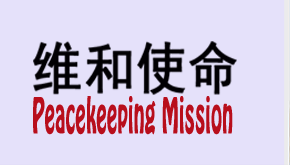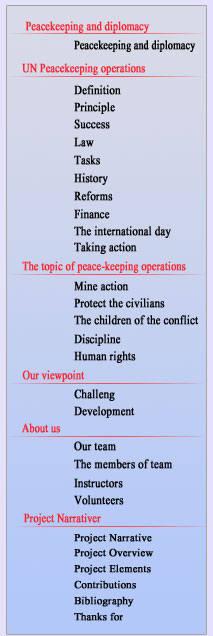One is the principle of the consent of all parties
It is not deployed the United Nations peace-keeping operations until required by the main parties to the conflict consent to. This requires the parties undertook to reach a political process. Once accepting the mandate for the United Nations peacekeeping operations, they provide the necessary freedom of movement, both political and practical aspects. Without such consent, peace-keeping operations is likely to become a party to the conflict; And towards implementation of the action, so as to deviate from its basic peacekeeping role. Main parties agreed to the deployment of United Nations peacekeeping operations may not represent or guarantee that agreed at the local level, particularly in the main party within the case of secession or weak command and control system.
Second principle of Justice
Justice is critical to maintain the main parties agreement and cooperation, but it should not be confused with a neutral or omission. United Nations peacekeeping personnel in the treatment of the parties to the conflict should be fair, but in the discharge of its mandate should not be neutral. Just as outstanding referees must not only maintain fair but also give punishment for unruly behaviour, peace-keeping operations should not condone any party to impede the peace process efforts or in violation of United Nations peace-keeping operations of adhering to international norms and principles of the act.
Despite the need to establish and maintain good relations with the parties, peace-keeping operations must be careful to avoid possible detriment to th e impartial image of the activities carried out. Mission should not be fear of misinterpretation or retaliation so as to escape the strict implementation of the principles of justice. Failure to do so may undermine the credibility and legitimacy of peacekeeping operations, which could also lead to a party or multiparties refuse to continue to exist. e impartial image of the activities carried out. Mission should not be fear of misinterpretation or retaliation so as to escape the strict implementation of the principles of justice. Failure to do so may undermine the credibility and legitimacy of peacekeeping operations, which could also lead to a party or multiparties refuse to continue to exist.
Third, unless the causes of performancing duties or in self-defence they may not use force
United Nations peace-keeping operations is not an implementation tool. Nevertheless, they can be under the authority of the Security Council for the purpose of self-defence and discharging its responsibilities by using of force at the tactical level. In some turmoil, given to United Nations peace-keeping operations by the Security Council "forceful" authorization, authorizes them to "use all necessary means" deterrence force attemptting to undermine the political process, protection of civilians threatened by imminent attack, and/or to assist national authorities to maintain law and order. |


